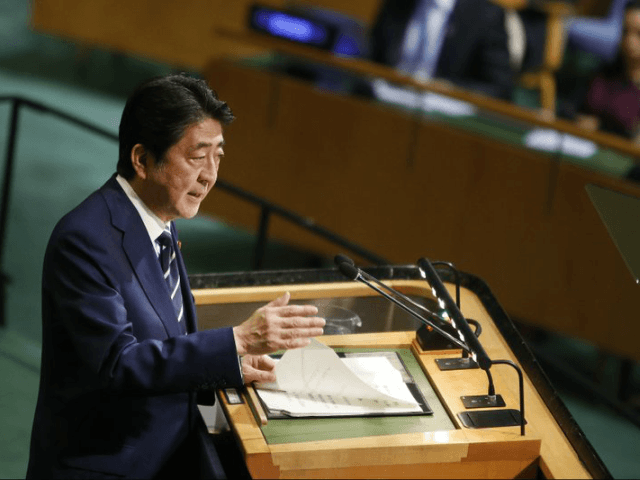Japanese Prime Minister Shinzo Abe spoke to the United Nations General Assembly on Tuesday, his first major performance on the world stage after securing a third term and all but ensuring he will become the longest-serving prime minister in Japanese history.
Abe said he would use that third term to “strengthen the free trade system” and “clear the postwar structure from northeast Asia.”
Abe elaborated that “clearing the postwar structure from northeast Asia” includes steps like working with Russian President Vladimir Putin to resolve territorial deadlocks stretching back 70 years. Russia and Japan have yet to formally end their World War 2 hostilities with a peace treaty.
Abe also commented on Japan’s relationship with China, noting that he plans to visit China next month and then host President Xi Jinping in Japan. He said protecting Japan’s economic zone, and those of other ASEAN nations, to “preserve the blessings of open seas” was a top priority and gently suggested China is not on the right side of the issue by failing to list it alongside the U.S., Australia, and India as a helpful partner:
The countries of ASEAN lie at the “confluence of the two seas,” the Pacific and Indian Oceans. And it was the forerunners living in what we now call the Pacific island countries who in eras long past crossed these two oceans to introduce products to faraway eastern Africa.
What I call the “Free and Open Indo-Pacific Strategy” derives from our desire to preserve the blessings of open seas, together with these very countries, as well as the United States, Australia, India, and others, and indeed, all countries and peoples who share the same intent.
What must control our sea and air spaces that are broad and wide is the rule of law, and the rules-based order, which are in turn backed by solid institutions. Hence my strategy.
Abe’s “brief comments on the state of relations with China” pointedly failed to mention China at all, aside from inviting Xi Jinping to visit Japan. He quickly segued into Japanese efforts to help educate children in the Gaza Strip and its hosting of international conferences such as the G20 summit and the Tokyo International Conference on African Development.
Another bit of unfinished business Abe wants to resolve is North Korea’s abduction of Japanese citizens. The matter has been a top concern of Japan as it works with the United States and South Korea on terminating North Korea’s nuclear weapons program and resolving Japan’s security concerns with the belligerent North Korean regime.
Abe said he was ready to work with North Korea on economic renewal and is prepared to meet in person with dictator Kim Jong-un, but only if North Korea is prepared to resolve the abductee issue. He made it clear failure to do so would be a deal-breaker for Japan:
As someone who appealed for the full implementation of all relevant U.N. Security Council resolutions, I pay the greatest interest to changes in North Korea. North Korea is now at a crossroads, at which it will either seize or fail to seize the historic opportunity it was afforded.
North Korea has both untapped natural resources and a labor force whose productivity can be greatly enhanced. Japan’s policy of seeking to settle the unfortunate past and normalize its relations with North Korea once the abductions, nuclear, and missile issues are resolved will not change. We will be unstinting in our assistance to unleash the potential North Korea holds.
However, I am asked to reiterate one thing time and time again: we will bring about the return of all Japanese abductees. I am determined to make this a reality. In order to resolve the abductions issue, I am also ready to break the shell of mutual distrust with North Korea, get off to a new start, and meet face to face with Chairman Kim Jong-un.
At present, nothing has been decided regarding a Japan-North Korea summit meeting, but if we are going to hold one, then I am determined it must be a meeting that contributes to the resolution of the abductions issue.
Abe concluded by noting an era of Japanese history will soon come to an end with the abdication of Emperor Akihito, the first imperial succession by abdication in two hundred years. He anticipated a global spotlight on Japan for this momentous occasion and described it as a time of deep reflection for the Japanese people.
“It is as if a new breeze is now about to blow in Japan,” he said, speaking of the older generation’s duty to help young people take on the challenges of the future – a poignant sentiment for a country facing a demographic crisis as enormous as Japan’s.
Abe concluded his speech by politely beating the stuffing out of the United Nations for its failure to reform:
In closing, I will state that in light of the lack of progress in reforming the Security Council, the significance of the United Nations in the 21st Century world is already being starkly questioned.
But that is precisely why Japan will never let up in its contributions to the United Nations. I will end my address with a pledge that Japan, together with Secretary-General Guterres, will push forward with the reform of the Security Council and the reform of the United Nations.
The prime minister then smiled at the institution he just called out as corrupt and possibly irrelevant, folded up his notebook, bowed, and departed the podium.

COMMENTS
Please let us know if you're having issues with commenting.